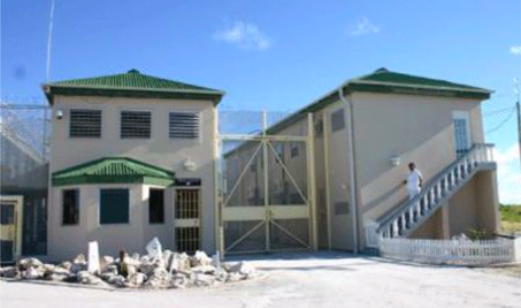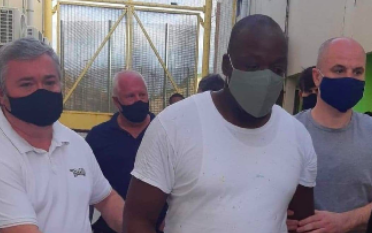Turks and Caicos Islands Prisoner transferred to the UK
Prisoner Christopher Barnes was escorted to the United Kingdom by British Prison Officers on the 12 th January. Mr Barnes, who has been convicted of two murders was moved over safety concerns, with HMP Grand Turk lacking the necessary high security facilities to hold such a high-risk inmate.
NEWS FROM THE OVERSEAS TERRITORIESTURKS & CAICOS ISLANDS
Prisoner Christopher Barnes was escorted to the United Kingdom by British Prison Officers on the 12 th January. Mr Barnes, who has been convicted of two murders was moved over safety concerns, with HMP Grand Turk lacking the necessary high security facilities to hold such a high-risk inmate. The prisoner will carry out the remainder of his double life sentence in a category A prison in the United Kingdom.
The Turks and Caicos Islands have seen a regrettable increase in serious crime over the last few years, particularly surrounding illegal drug smuggling. This surge in high profile crime has coincided with a reduction in the capabilities of the territory’s prison HMP Grand Turk. The prison suffered extensive damage from hurricanes Irma and Maria in late 2017. To make matters worse, the prison’s high security wing was destroyed in a fire, leaving the islands without any such facility.
This situation has all unfolded within the context of a deeper issue surrounding overcrowding and rioting within HMP Grand Turk. A policy of giving criminals longer sentences than they would receive for their crimes in the UK has strained capacity in the prison. In recent years greater initiative from the Royal Turks and Caicos Islands Police Force - one of the world’s oldest police forces - has seen a successful crack down on crime, however this has added to the number of prisoners incarcerated. The overcrowding has exacerbated racial tensions between different nationalities in the prison, with many “non-belongers” resenting TCI guards, leading to riots and violence.
Mr Barnes is not the only prisoner to have been transferred from the territory in the last 12 months. On 26 th November 2020 two prisoners were transferred to the Cayman Islands due to similar concerns, with both prisoners having caused considerable disruption and unrest in the prison. While HMP Grand Turk was unsuitable to house these prisoners, it was not deemed necessary to transfer them to a prison in the United Kingdom. This allowed the Cayman Islands, a fellow British Overseas Territory, to step in and provide support.
The constitutional link that allows for such a close justice relationship between the United Kingdom and the Overseas Territories dates all the way back to 1884 with the Colonial Prisoners Removal Act. If a significant risk is posed to the prisoner or the prisoner themselves constitutes a high-level security risk, then they may be transferred to the UK. This act not only allows for the transfer of prisoners to the UK but also for the transfer of prisoners between the OTs, as was seen with the transfer from the TCI to the Cayman Islands.
This relationship mirrors that between the UK and the Crown Dependencies.
The recent prisoner transfer to the United Kingdom is part of a broader strategy of improving national security in the Turks and Caicos Islands. The territory faces a tough challenge in the years ahead, with issues of overcrowding, violence and increased high-level crime all occurring simultaneously at a time in which the capabilities of HMP Grand Turk are greatly compromised.
Cooperation between the OTs and the UK is of critical importance in solving security and justice related issues. The ability to transfer prisoners between themselves as well as to the UK is a vital short term solution to the OTs, which, with small populations and often relatively low levels of crime do not have the security infrastructure to hold more dangerous criminals. However, prisoner transfer is only a short-term solution. The OTs have to pay for all costs incurred in the transfer and subsequent care of the prisoner; a cost that simply makes this option unviable to many of the OTs. Furthermore, a prisoner transfer inevitably leads to difficult questions. For example, what is to happen to the prisoners at the end of their sentences? Do they return to their territory of arrest or remain in the territory of their imprisonment? Is it moral to move prisoners thousands of miles away to the UK? If prisoners are “non-belongers” should they be extradited to the country of their origin instead?
To tackle these issues the UK should explore how to better increase the capabilities of prisons in the Overseas Territories, continuing their close partnership such as “departmental twinnings” with the Ministry of Justice and the training of staff in the Overseas Territories. The transfer to the Cayman Islands shows how cooperation between the OTs has the potential to be greatly beneficial and the OTs should explore the opportunity to work together with the Crown Dependencies who face similar challenges.
Whether or not a regional high security facility will be constructed to service the Caribbean British Overseas Territories, remains to be seen.


HMP Grand Turk


Christopher Barnes being escorted from HMP Grand Turk by British Prison Officers
